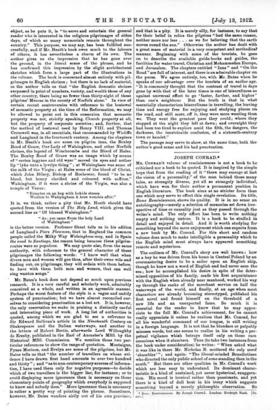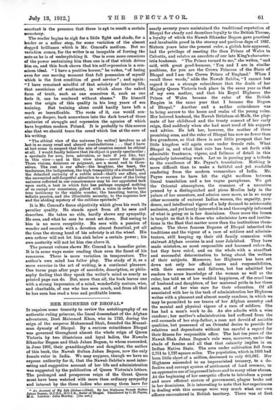JOSEPH CONRAD.•
Mn. CONRA.D.8 volume of reminiscences is not a book to be criticised nor a book to be quoted. It is inspired by the simple hope that from the reading of it " there may emerge at last the vision of a personality." of the man behind those many tales, so strangely diverse, yet all so strangely individual, which have won for their author a permanent position in English literature. The book aims at no stricter form than one which may serve to effect this single revelation. Its title, Some Reminiscences, shows its quality. It is in no sense an autobiography—merely a selection of memories set down irre- spective of time or causality just as they passed through the writer's mind. The only effort has been to write nothing empty and nothing untrue. It is a book to be studied in detail and enjoyed in detail. And it is worth studying for something beyond the mere enjoyment which one expects from a new book by Mr. Conrad. For this short and random volume does much to make intelligible a personality which to the English mind must always have appeared something remote and mysterious.
The outlines of Mr. Conrad'a story are well known : how as a boy he was driven from his home in Central Poland by an overmastering desire to be a sailor upon an English ship, though he knew not a word of English and had never seen the sea ; how he accomplished his desire in spite of the deter- mined opposition of his family, made his first acquaintance with the English when already near manhood, worked his way up through the ranks of the merchant service on half the waterways of the world, and finally, at an age when most characters are already becoming stereotyped, published his first novel and found himself on the threshold of a. new life and an unexpected fame. So much it der essential for the reader to know that he may appre- ciate to the full Mr. Conrad's achievement, for he cannot really appreciate it unless he realizes that Mr. Conrad, for all his wonderful command of our tongue, is stilt writing in a foreign language. It is not that he blunders or palpably misuses words, but one seems to realize in his writing a per- petual vigilance which betrays itself only on those rare occasions when it slumbers. Thus (to take two instances from the book under consideration) he writes: " When asked what it was like in there Mr. Nicholas B. muttered Me only word shambles' " ; and again: " The liberal-minded Benedictines who directed the only public school of some standing then in the south." But there are other qualities in Mr. Conrad's work which are less easy to understand. Its dominant charac- teristic is a kind of sustained, yet never hysterical, exaggera- tion. His mood is ironical rather than passionate, and yet there is a kind of dull heat in his irony which suggests something beyond a merely philosophic observation. So • Some Reminiscences. By Joseph Conrad. London: Eveleigh Nash. [5s. net.'
constant is the pressure that there is apt to result a certain monotony.
The reader begins to sigh for a little fight and shade, for a louder or a softer stop, for some variation of the almost dogged brilliance which is Mr. Conrad's medium. But no variation comes, for the writer is as incapable of forcing the note as he is of underpitching it. One is even more conscious of the power restraining him than one is of that which drives him on, and this book shows that his self-repression is a con- scious ideal. "I have a positive horror," he writes, "of losing even for one moving moment that full possession of myself which is the first condition of good service " ; and again : "I have remained mindful of that sobriety of interior life, that asceticism of sentiment, in which alone the naked form of truth, such as one conceives it, such as one feels it, can be rendered without shame." He himself sees the origin of this quality in his long years of sea training. But training alone could hardly have left a mark so ineradicable. The roots of it, one would con- ceive, go deeper, back somewhere into the dark heart of those centuries of struggle and repression the agonies of which have begotten modern Poland. It is probably to this source also that we should trace the creed which lies at the core of his writing.
" The ethical view of the universe [he writes] involves ns at last in so many cruel and absurd contradictions . . . that I have at last come to suspect that the aim of creation cannot be ethical at all. I would fondly believe that its object is purely spectacular : a spectacle for awe, love, adoration, or hate if you like, but in this view—and in this view alone—never for despair. Those visions, delicious or poignant, are a moral end in them- selves. The rest is our affair—the laughter, the tears, the tenderness, the indignation, the high tranquillity of a steeled heart, the detached curiosity of a subtle mind—that's our affair, and the unwearied self-forgetful attention to every phase of the living universe reflected in our consciousness may be our appointed task upon earth, a task in which fate has perhaps engaged nothing of us except our conscience, gifted with a voice in order to bear true testimony to the visible wonder, the haunting terror, the infinite passion, and the illimitable serenity, to the supreme law and the abiding mystery of the sublime spectacle."
It is Mr. Conrad's fierce objectivity which gives his work its peculiar quality. He stands apart from all he sees and
describes. He takes no side, hardly shows any sympathy.
He sees, and what he sees he must set down. But seeing to him is no mere receptivity. He sees with a passion of wonder and records with a devotion almost fanatical, yet all the time the strong hand of his sobriety is at the wheel. His own ardour will not let him sink below a certain power ; his own austerity will not let him rise above it.
The present volume shows Mr. Conrad in a homelier guise.
It is in some ways easier reading than even the finest of his romances. There is more variation in temperature. The author's own mind has fuller play. The study of it, as a
mere exercise in the art of writing, is a continual pleasure. One turns page after page of anecdote, description, or philo- sophy feeling that they speak the writer's mind as nearly as
printed page can do. But, more than all, the hook leaves one with a strong impression of a mind, wonderfully mature, wise, and charitable, of one who has seen much, and from all that he has seen has read a true and profitable lesson.







































 Previous page
Previous page